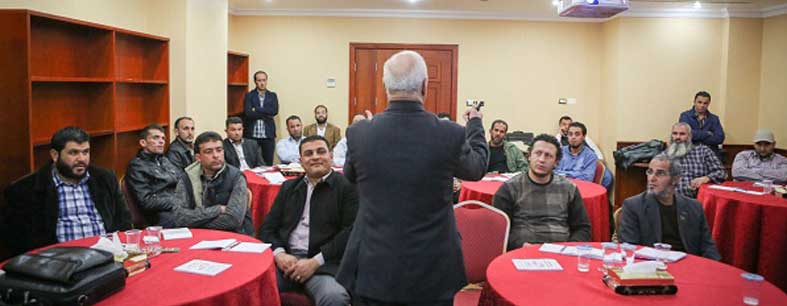It’s a Saturday morning in the conference room of a Tripoli hotel. Inside, Mohammed El Bishdy, a professional trainer of human resource development is imparting knowledge and techniques to a group of 25 participants on communication skills, awareness and leadership qualities as part of the LPRD Civic Empowerment Programme.
It’s a Saturday morning in the conference room of a Tripoli hotel. Inside, Mohammed El Bishdy, a professional trainer of human resource development is imparting knowledge and techniques to a group of 25 participants on communication skills, awareness and leadership qualities as part of the LPRD Civic Empowerment Programme.
El Bishdy, who is also currently giving similar lectures to employees of the General National Congress (GNC), tells the assembled group, “Nations can only be built by developing the youth and younger, future generations. They say life is communication and those who are not proficient in talking to each other and expressing themselves cannot live in a good way.”
It’s the beginning of the session and the focus of the lecture is about the importance of good, effective communications, El Bishdy says afterwards during a break from the tutorial, “Today is all about how to deal with different kinds of people and how to exchange points-of-view and accept contrasting opinions.”
In life, El Bishdy continues, on most days there are issues to deal with, problems to resolve, conflicts of opinion and ideas. “The skill of communication and dialogue is an essential part of human resource management and development; if you build a construction, the foundation needs to be solid, and the foundation of management and administration is communication.”
Back inside the conference room Zuhair Bakeer, head of the Libyan Programme for Reintegration and Development’s (LPRD) Civic Empowerment Programme, says, “We want to teach these people more in the way of communication and leadership, give them more skills to be more effective. During the revolution they were the local military and political leaders in different parts of the country. Now we need them to focus on advising and educating all former Thuwar about the transition from revolution to the rebuilding of our new State.”
The 25 participants from a total of 200 from all across Libya are attending three days of lectures on awareness, leadership skills, how to positively interact and influence people, share opinions and how to debate. The three days are a precursor to traveling to Kosovo in central Europe for a further 10 days learning and fact-finding.
“10 years ago, Kosovo faced a post-conflict situation similar to ours and what we face now. Their reintegration of former fighters and revolutionaries was a successful experience from which we can learn,” says Bakeer.
Kosovo rebuilt their institutions and they accepted the minority peoples and groups within their new nation state, Bakeer says. “They adopted a model of de-centralisation in the form of local governance and their application of this model has been a success in Kosovo; this is something we would like to learn from in the process of creating and building a new Libya.”
At the end of the third and final day, Salim Saeed Abdullah from Western Libya, is clutching a certificate whilst complimenting the LPRD programme. “I ask the LPRD to continue supporting leaders across the country and I know we will be effective in Libya and will be positive in teaching people. I encourage them to train more of us and continue with this initiative.”
Salim says he has learned much over the course of the three days, including how to take and make decisions from all manner of angles and perspectives. “I will use what we have been taught to establish an organisation of Libyan leaders to support and teach about transferring from revolution to rebuilding our country.”

